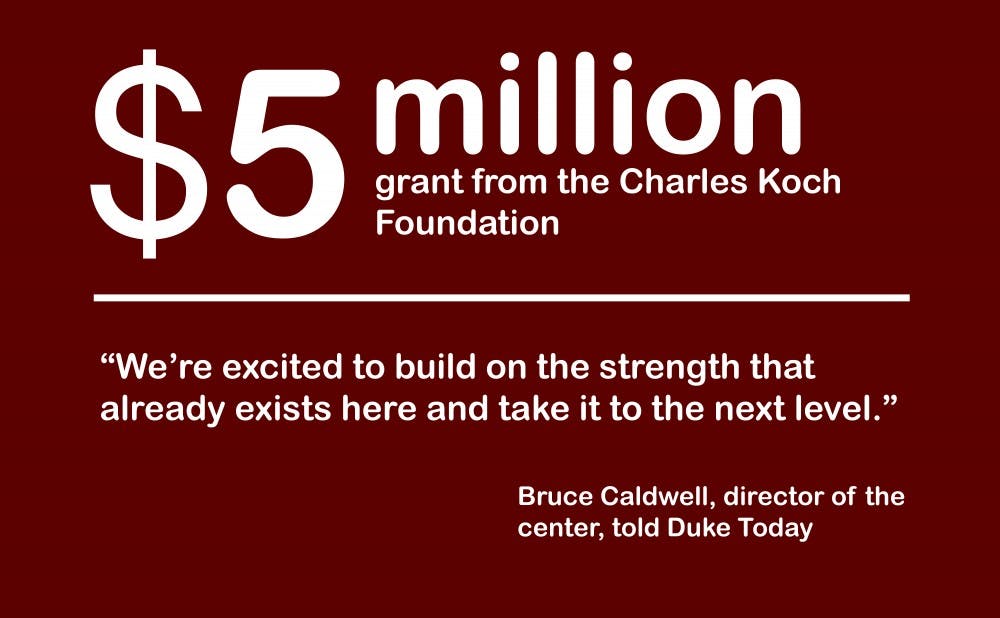In a column published in the The Chronicle on 24 September 2018 and reprinted on 26 September, Eladio Bobadilla attacked the Center for the History of Political Economy at Duke University in a completely irresponsible manner. Using the tactics of innuendo and guilt by association reminiscent of the McCarthy era, he seeks to associate the faculty and fellows of the Center with the despicable forces of bigotry and white supremacy. These scurrilous insinuations would be laughable if they were not so vile. It is hypocritical to group the Center among those for whom “history and truth are reduced to whatever the powerful say they are” when Mr. Bobadilla has himself shown no respect for the truth and has not bothered with the due diligence that one might expect from a professional historian of checking the facts and gathering evidence for his assertions – for example, by visiting the Center and talking to its faculty and fellows and learning something about what they are and what they do. As the senior members of the Center, we are happy for the opportunity to put the facts on the table.
Duke has a long-established tradition of studying the history of the economics discipline and how it relates to other disciplines, government, and the economy. The Center for the History of Political Economy was established in 2008 to promote research in this area and to secure Duke’s position as the most important center of research in the history of economics in the world. The Center edits the premier journal in the field, published for the past fifty years by Duke University Press. It hosts pre- and post-doctoral fellows and senior scholars from all around the world. It sponsors the most important annual conference series in the field. And it has worked closely with the Rubenstein Library to develop the single most important collection of economist’s academic papers in the world: the Economists’ Papers Archive, which houses the papers of eleven Nobel Prize winners and more than fifty other notable economists, as well as the official archives of the American Economic Association and the History of Economics Society.
The Center has no ideological orientation and takes no political positions. Were Mr. Bobadilla to examine the Center’s working paper series (available online) or attend some of its weekly workshops, in which a large variety of historical topics are freely discussed – he would see how absurd it is form him to characterize the Center as “a stronghold for Austrian economics.” In fact, only one permanent member of the Center has any academic interest in Austrian economics: the director, Bruce Caldwell, is the editor of the collected papers of Nobel-Prize-winning economist Friedrich Hayek (published by University of Chicago Press). The remaining permanent members of the Center are interested in a variety of other subjects, such as the history of the role of mathematics in economics, the history of art markets, and the history of macroeconometric modeling, with no relationship to Austrian economics. And the research interests of the fellows are even more diverse than those of the senior members.
It is true that the Center was founded with a grant from the Pope Foundation. Like other academic institutions, the Center receives funds from a variety of sources. The Center’s funding has included grants from George Soros’s Institute for New Economic Thinking and the National Endowment for the Humanities. All these funds are given for particular purposes, but none of them dictate what any member of the Center may think or write, and none of them seeks to engage the Center behind any political position. The funders do not require such strings, and the faculty in the Center would not accept such limitations on their academic freedom.
Over the past several years, three distinguished scholars in the history of economics have retired from Duke, leaving a large hole in the faculty of the Center. The $5 million grant from the Koch Foundation is to be used primarily to support hiring faculty to fill that gap, as well as to provide support to the library for digital archiving. The funds do come with a purpose; but they come with no strings. Neither the university nor the Center would have accepted funds that in any way sought to limit or guide the scholarship of the Center or the faculty or fellows that it supports. The hiring process for these faculty is the completely standard one in which the donor has no voice whatsoever – much less a veto.
Mr. Bobadilla has levied an ad hominem attack on scholars and a scholarly institution that is grounded in ignorance of them and their work. In associating them with white supremacists and racists, implying their support for views that they abhor, and in mischaracterizing their scholarly activities and interests, he engages in a truly ugly kind of name-calling that should have no place in a great university, and he skates very close to libel. It is distasteful to have to answer such charges in print. But it would be pusillanimous to leave them unchallenged. They are ugly, absurd, and false. To use the phrase of the philosopher/economist Jeremy Bentham, they are “nonsense upon stilts.”
Kevin D. Hoover is a professor of economics and philosophy. E. Roy Weintraub is a professor emeritus of economics. Bruce J. Caldwell is a research professor of economics.
Get The Chronicle straight to your inbox
Sign up for our weekly newsletter. Cancel at any time.

